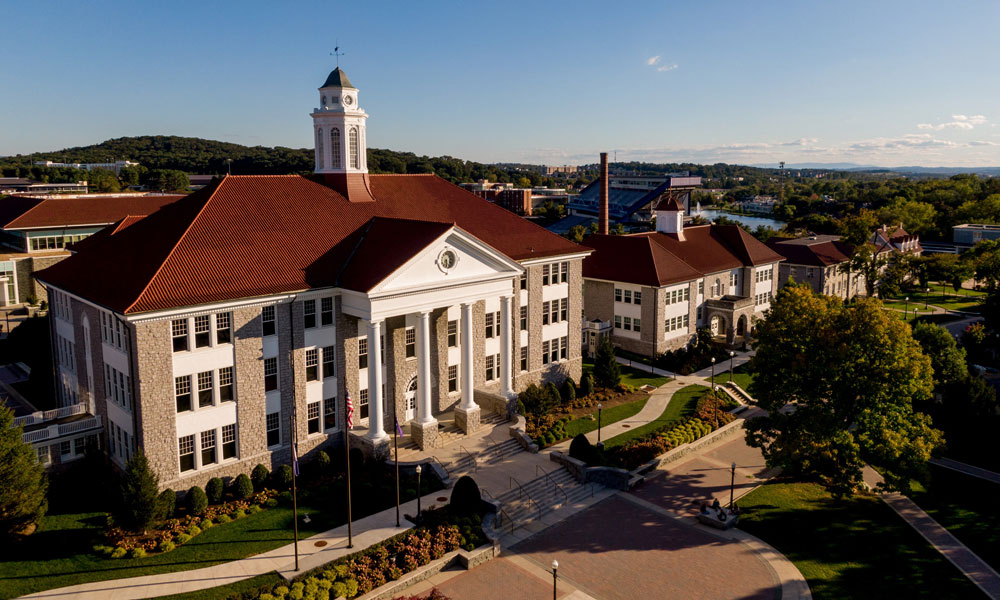Doctoral Student Megan Rodgers Good Researches How Work Makes a Difference
Office of the Provost
Megan Rodgers Good, a doctoral student in the Assessment and Measurement program at JMU, is constantly searching for the answer to how classes, research projects, and university centers make a difference in the lives and learning outcomes of JMU students, faculty, and staff.
From her participation on research teams as a master’s student in Psychological Sciences program to her work as a graduate assistant in the Center for Faculty Innovation, Rodgers Good has sought research projects that lend insight into how to evaluate a program’s effectiveness and learning impact. With her eyes to the future, Rodgers Good is now working to build a model that “closes the gap” between program assessment and educators’ use of the results.
Rodgers Good credits JMU’s unique culture of collaboration for enabling her work with an advisor, Dr. Keston Fulcher, to build a research program that she hopes will result in a national model for how to use assessment results. Rodgers Good’s research and passion has emerged through and has been fostered in partnerships between, among others, JMU’s Center for Assessment and Research Studies and the Center for Faculty Innovation. “There is really not another place where this could happen, where such diverse offices are working together to achieve something bigger than they could do alone.”
Working at JMU’s Center for Faculty Innovation (CFI) has played an important role in helping Rodgers Good develop an understanding of how educators make sense of assessment results and has afforded her with opportunities to participate in numerous studies of CFI programming. Recently, The Chronicle of Higher Education cited Rodgers Good’s research on the impact of centers that was done with Dr. Cara Meixner, Assistant Director of the CFI and Assistant Professor of Graduate Psychology.
As the Chronicle tells, Rodgers Good’s and Meixner’s research “found that the center’s [CFI] services resulted in an increased sense of belonging to the institution among faculty members; more-frequent opportunities to engage in metacognition, or thinking about their thinking; and greater confidence in designing courses.” Throughout their work together, Dr. Meixner noted Rodgers Good’s poise and confidence and commented on Rodgers Good’s desire to seek feedback while always thinking critically about other’s perspectives. Meixner recalls “Just after our ‘standing-room only’ co-presentation at a national pedagogy conference, numerous colleagues from other institutions commented to me about how fortunate the CFI is to have [Rodgers Good’s] talent, grace, and intellect.” Meixner could not agree more. She believes that Rodgers Good “Is a rare professional who has created a dual career niche in the assessment and faculty development communities.”
Rodgers Good’s educational path as a future “double-Duke,” has also been characterized by a commitment to mentoring undergraduates in the classroom, in research teams, and on thesis projects. As a member of a research team in the Psychological Sciences, Rodgers Good had the opportunity to take on team leadership roles under the direction of Dr. Michael Stoloff. Rodgers Good’s role of supervisor and mentor to teams of undergraduate students in conducting original research, encouraged some students to stay on the project for as many as three semesters. Interestingly, one research project that surveyed alumni found that students who participated in undergraduate research were more likely to report that JMU enhanced their life.
Given her leadership in graduate and undergraduate research teams as well as her varied experiences across campus in program assessment, it is not surprising that Rodgers Good was invited to participate as the graduate student representative on the Madison Futures Committee. As a member of the academic subcommittee, she contributed to vital conversations about the academic direction of the university. Rodgers Good’s eyes lit up as she described her work on this committee: “It was a really meaningful experience. It felt like we were making a difference.”
When asked to describe her experience at JMU with one word, Rodgers Good chose “fulfilling.” “It has enabled me the opportunity to develop into a professional and to be part of a larger community.” She explains that one of the benefits of staying at JMU for both her masters and doctoral programs has been the varied opportunities to build partnerships across the university, to not only develop confidence in her skills and abilities, but to also develop a professional identity with a clear goals for the future.
Rodgers Good’s and Meixner’s research in the Chronicle can be found here: Views Diverge Sharply on Whether Learning Centers Improve Teaching.
